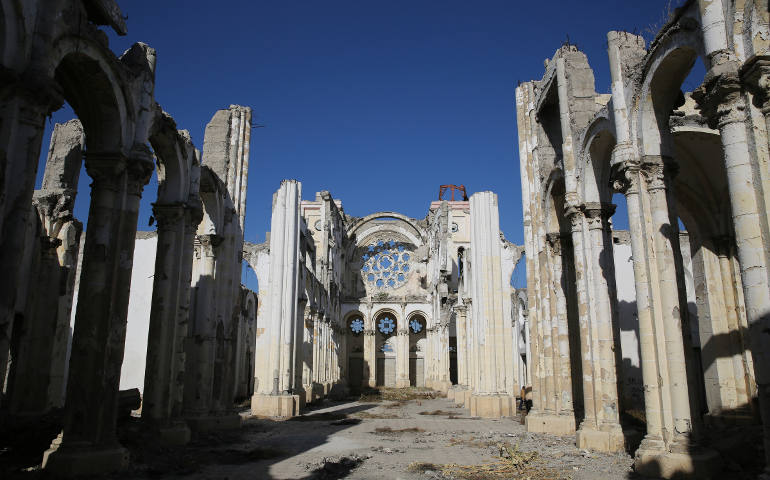
This Feb. 18 photo shows the ruins of Our Lady of the Assumption Cathedral, which was destroyed during the 2010 earthquake in Port-au-Prince, Haiti. Masses are being held at the transitional cathedral which was built next to the historic cathedral. (CNS photo/Bob Roller)
The Port-au-Prince archdiocese continues to rebuild its ministries since the country's 2010 earthquake, with dozens of programs underway and the construction of a transitional cathedral viewed as a major accomplishment.
Archbishop Guire Poulard of Port-au-Prince said that while progress has been slow, it has been steady with assistance coming from Haitian Catholics, the Haitian diaspora and international partners for pastoral efforts and some reconstruction projects.
"Now we have about 60 active projects," Poulard told Catholic News Service at the offices of the Haitian bishops' conference near Port-au-Prince.
He said most of the projects are pastoral in nature, with 30 new parishes being formed and new ministries introduced with an emphasis on greater lay involvement and support for religious congregations serving rural and urban communities.
"Haitian churchgoers, both in the country and the diaspora, are determined to rebuild the church and their country. But it will go slow," he said.
Construction of a transitional cathedral adjacent to the destroyed Cathedral of Our Lady of the Assumption has been the most visible of the archdiocese's undertakings. The 1,500-seat transitional cathedral was dedicated in November with church leaders from the U.S. and elsewhere attending.
Poulard, 73, acknowledged that he faced a major task when he was appointed to the Port-au-Prince archdiocese Jan. 12, 2011, exactly one year after the earthquake. Port-au-Prince Archbishop Joseph Serge Miot was among the thousands who died in the disaster.
Poulard arrived in the capital after serving as bishop in the Jacmel and Les Cayes dioceses for a total of 23 years and after the Haitian bishops and other partners created Partnership for the Reconstruction of the Church in Haiti, or PROCHE, to manage church-related reconstruction projects in the earthquake zone.
The reconstruction projects the archdiocese has overseen are in addition to those undertaken by the PROCHE, a cooperative venture involving the Haitian bishops' conference, U.S. Conference of Catholic Bishops, Catholic Relief Services and Adveniat, the German bishops' agency for solidarity with Latin American development agencies.
Poulard said that while he was "content" knowing PROCHE exists, he has not worked closely with the organization during his four years in Port-au-Prince other than to sign off on various projects so planning and construction could continue. He said he has felt uncomfortable with the program because it has imposed requirements which he considers too strict and left little room for negotiation.
"They have to trust us because it is a symbol of dignity for us, Haitian dignity," he said.
Archbishop Thomas G. Wenski of Miami, with long ties to Haiti and the Haitian community in South Florida, defended PROCHE's work. He said its deliberate process and insistence that new buildings meet international standards for earthquake and hurricane resistance are justified.
He described PROCHE as an entity of the Haitian bishops' conference and said a steering committee that includes Haitian bishops and representatives of international bishops conferences funding the program work under specific guidelines developed as the organization formed in late 2010.
Wenski represents the U.S. Conference of Catholic Bishops on the committee.
"We're respecting donor intent by saying we're going to fund buildings, but we're going to fund buildings that meet certain standards," he explained.
As for the eventual reconstruction of the Cathedral of Our Lady of Assumption, Poulard told CNS that the project is massive and that he will leave it for his successor to deal with after he retires in January 2017.
He said it may be 20 years or longer before the archdiocese would be able to raise the $30 million to $40 million needed for the project.
"What's really significant for me is that the Haitian people can contribute to the erection of that new cathedral as they did for the cathedral that collapsed during the earthquake," he said.
Editor's note: Want more stories from Eco Catholic? We can send you an email alert once a week with the latest. Just go to this page and follow directions: Email alert sign-up.


